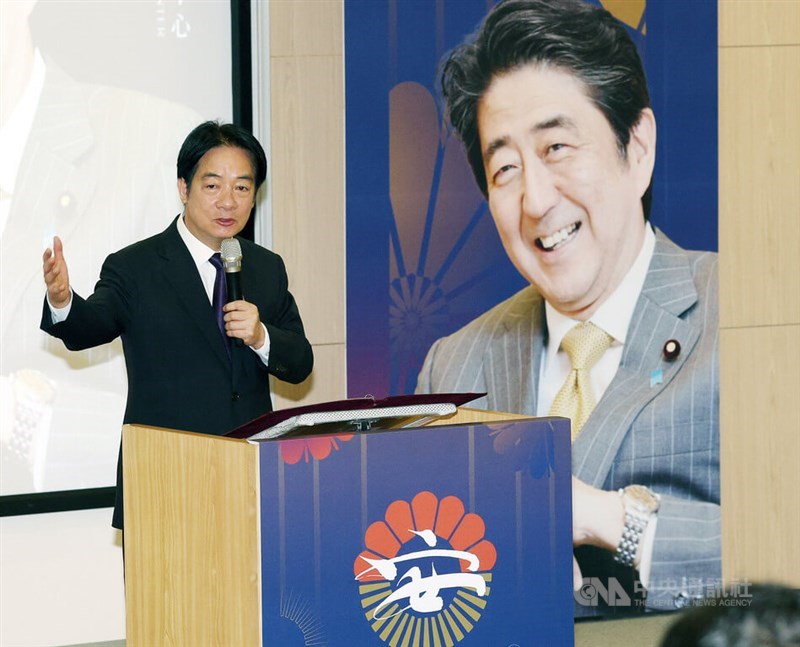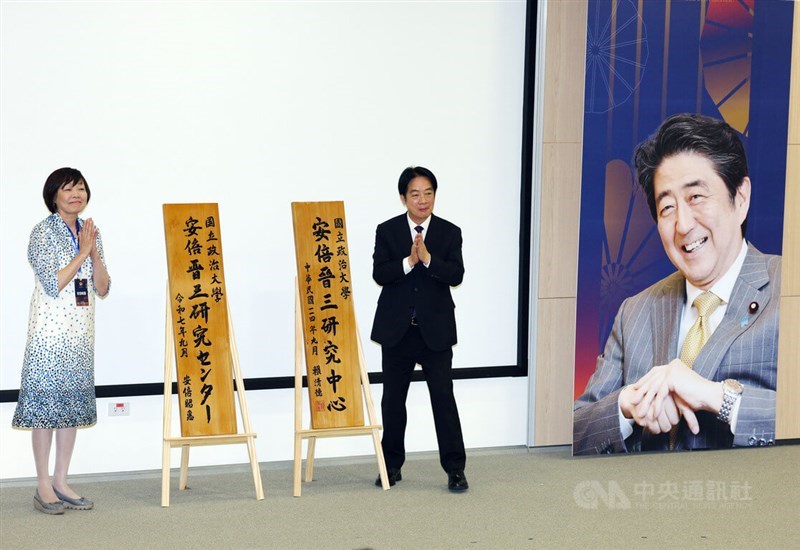Lai lauds new Abe research center as platform for Taipei-Tokyo cooperation

Taipei, Sept. 21 (CNA) President Lai Ching-te (賴清德) on Sunday lauded the establishment of a research center in Taipei named after late former Japanese Prime Minister Shinzo Abe as an important platform for developing future Taiwan-Japan cooperation.
Speaking during a ceremony to mark the opening of the research center at the Taipei-based National Chengchi University's (NCCU) College of International Affairs, Lai said Abe, the longest-serving prime minister in Japanese history, was not only a great Japanese politician but a close friend of Taiwan.
Following the Tainan and Hualien earthquakes in 2017 and 2018, respectively, Abe not only expressed condolences to the Taiwanese people but also offered help in post-disaster relief and rebuilding, Lai said.
After stepping down as prime minister in September 2020, Abe began advocating the idea that "a Taiwan contingency is a contingency for Japan," against the backdrop of increased Chinese military pressure on Taiwan.
It was also Abe who first proposed the idea of a free and open Indo-Pacific, which was later adopted by the United States and American allies, leading to the formation of the Quadrilateral Security Dialogue, or Quad, between Japan, the U.S., Australia, and India.
"We have Abe's foresight to thank for the peace we are enjoying in Taiwan now, rather than war," the president said.
Abe's death was not only a loss for Japan and Taiwan, but for the whole world, Lai said.
The opening of the Abe research center coincided with Abe's birthday on Sept. 21, which is also the International Day of Peace, as designated by the United Nations, noted the president.
Lai said he hoped the research center would cultivate talent and promote the study of Abe's ideals and policies, and become an important cooperation platform between the two countries.
Joining Sunday's ceremony in Taipei was Abe's wife Akie Abe, who expressed her gratitude to Taiwan and NCCU for establishing the center under her late husband's name.

Though she is not a politician, Akie Abe said she began to learn more about her husband's ideals after his passing. She said she wished to continue the cordial exchanges between Japan and Taiwan that took place under her late husband's leadership, so that his legacy could be passed down to future generations.
Abe died on July 8, 2022, at the age of 67, hours after he was shot twice by a man with a makeshift shotgun on a street in Nara, near Osaka, during an election campaign. He served as prime minister from 2006-2007 and from 2012-2020.
Lai, who was then vice president of Taiwan, attended Shinzo Abe's wake in Tokyo.
Abe is remembered by some Taiwanese -- especially supporters of the ruling Democratic Progressive Party -- as a staunch supporter of Taiwan, partly because he introduced the idea that "a Taiwan contingency is a contingency for Japan."
In an article published by the Los Angeles Times months before his death, Abe also urged the United States to abandon its long-standing policy of strategic ambiguity toward Taiwan, under which Washington does not commit to sending troops to help Taiwan in the event of a Chinese invasion.
However, Abe's nationalistic policies also made him a controversial figure in Japanese politics.
One of the controversies surrounding Abe was the change of Japanese legislation in 2015 by his government to allow for the overseas deployment of Japanese troops for combat missions, which led to protests in the country.
-
Politics
President confers Order of Brilliant Star on Sadaharu Oh
02/26/2026 04:37 PM -
Politics
Taiwan, Japan raise working holiday visa limit to twice per person
02/26/2026 04:32 PM -
Society
Taipei Veterans General, NTU hospitals ranked in world's top 250
02/26/2026 03:17 PM -
Business
Taiwan shares close flat
02/26/2026 01:56 PM -
Sports
Cubs prospect Jonathon Long to withdraw from Team Taiwan at WBC due to injury
02/26/2026 12:42 PM